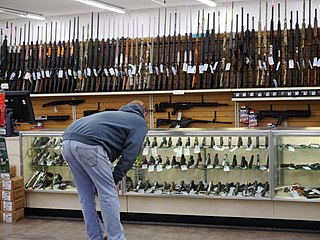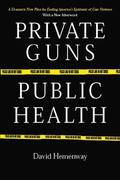Related Research Articles

The Centers for Disease Control and Prevention (CDC) is the national public health agency of the United States. It is a United States federal agency under the Department of Health and Human Services, and is headquartered in Atlanta, Georgia.

Gun control, or firearms regulation, is the set of laws or policies that regulate the manufacture, sale, transfer, possession, modification, or use of firearms by civilians.
Arthur L. Kellermann is an American physician and epidemiologist. Until his resignation in November 2022, he served as a professor of emergency medicine at the VCU School of Medicine, senior vice president of health sciences for Virginia Commonwealth University, and CEO of the VCU Health System. He was formerly professor and dean of the F. Edward Hébert School of Medicine at the Uniformed Services University of the Health Sciences. Kellerman served as director of the RAND Institute of Health and founded the department of emergency medicine at Emory University and the Center for Injury Control at Rollins School of Public Health. His writings include 200 publications on various aspects of emergency cardiac care, health services research, injury prevention and the role of emergency departments in providing health care to the poor. Kellermann is known for his research on the epidemiology of firearm-related injuries and deaths, which he interpreted not as random, unavoidable acts but as preventable public-health priorities. Kellermann and his research have been strongly disputed by gun rights organizations, in particular by the National Rifle Association, although Kellermann's findings have been supported by a large body of peer-reviewed research finding that increasing gun ownership is associated with increased rates of homicide and violence.
Gary Kleck is a criminologist and the David J. Bordua Professor Emeritus of Criminology at Florida State University.

The Bias Against Guns: Why Almost Everything You've Heard About Gun Control Is Wrong is a book by John Lott, following up on his controversial More Guns, Less Crime. It is intended to reach a broader audience than its highly technical predecessor. Lott explores what he sees as misconceptions about gun ownership, including the practice of carrying concealed weapons.

The Harvard T.H. Chan School of Public Health is the public health school of Harvard University, located in the Longwood Medical Area of Boston, Massachusetts. The school grew out of the Harvard-MIT School for Health Officers, the nation's first graduate training program in population health, which was founded in 1913 and then became the Harvard School of Public Health in 1922.

Gun violence results in tens of thousands of deaths and injuries annually in the United States. By 2022, gun violence was responsible for about 100 daily fatalities and hundreds of daily injuries. In 2018, the most recent year for which data are available as of 2021, the Centers for Disease Control and Prevention's (CDC) National Center for Health Statistics reports 38,390 deaths by firearm, of which 24,432 were by suicide. The rate of firearm deaths per 100,000 people rose from 10.3 per 100,000 in 1999 to 12 per 100,000 in 2017, with 109 people dying per day or about 14,542 homicides in total, being 11.9 per 100,000 in 2018. In 2010, there were 19,392 firearm-related suicides, and 11,078 firearm-related homicides in the U.S. In 2010, 358 murders were reported involving a rifle while 6,009 were reported involving a handgun; another 1,939 were reported with an unspecified type of firearm. In 2011, a total of 478,400 fatal and nonfatal violent crimes were committed with a firearm. Gun crimes are covered by 18 USC 922 and 18 USC 924, which are the principal federal firearm statutes.

Gun-related violence is violence committed with the use of a firearm. Gun-related violence may or may not be considered criminal. Criminal violence includes homicide, assault with a deadly weapon, and suicide, or attempted suicide, depending on jurisdiction. Non-criminal violence includes accidental or unintentional injury and death. Also generally included in gun violence statistics are military or para-military activities.

In 2018, the Small Arms Survey reported that there are over one billion small arms distributed globally, of which 857 million are in civilian hands. The survey stated that American civilians account for an estimated 393 million of the worldwide total of civilian held firearms, or about 120.5 firearms for every 100 American residents.

David Hemenway is a Professor of Health Policy at the Harvard School of Public Health. He has a B.A. (1966) and Ph.D. (1974) from Harvard University in economics. He is the director of the Harvard Injury Control Research Center and the Harvard Youth Violence Prevention Center. He is also currently a James Marsh Visiting Professor-at-Large at the University of Vermont. Hemenway has written over 130 articles and five books in the fields of economics and public health.

Private Guns, Public Health is a 2004 policy opinion book by David Hemenway, an economist who has served as Professor of Health Policy at the Harvard School of Public Health as well as the Director of Harvard's Injury Control Research Center. He argues that the widespread ownership of firearms in private hands in the U.S. promotes the spread of the "disease" of gun violence, and he takes a collective interpretation of the Second Amendment while stating that increased regulations are absolutely necessary in the purposes of public safety. Hemenway makes the central case that "more guns in a community lead to more homicide". He published the book through the University of Michigan Press in 2004. A new edition was released, also by the University of Michigan Press, in 2017.

Defensive gun use (DGU) is the use or presentation of a firearm for self-defense, defense of others or, in some cases, protecting property. The frequency of incidents involving DGU and their effectiveness in providing safety and reducing crime are controversial issues in gun politics and criminology, chiefly in the United States. Different authors and studies employ different criteria for what constitutes a defensive gun use which leads to controversy in comparing statistical results. Perceptions of defensive gun use are recurring themes in discussions over gun rights, gun control, armed police, open and concealed carry of firearms.

Proposals for universal background checks would require almost all firearms transactions in the United States to be recorded and go through the National Instant Criminal Background Check System (NICS), closing what is sometimes called the private sale exemption. Universal background checks are not required by U.S. federal law, but at least 22 states and the District of Columbia currently require background checks for at least some private sales of firearms.
Mark L. Rosenberg is an American physician and public health researcher. He joined the Task Force for Global Health in 1999, retiring as president and CEO in 2016. Rosenberg also served as Assistant Surgeon General and as Rear Admiral in the United States Public Health Service from 1995–2000. He has served on the faculty at Morehouse School of Medicine, Emory University School of Medicine, and the Rollins School of Public Health at Emory University. He previously worked at the Centers for Disease Control and Prevention (CDC) for approximately 20 years, dealing with eradication of smallpox, HIV/AIDS and enteric diseases. He also helped oversee research on gun violence through the National Center for Injury Prevention and Control (NCIPC).

Michelle Ann Williams is a Jamaican-American epidemiologist, public health scientist, and educator who has served as the dean of the Harvard T. H. Chan School of Public Health since 2016.
The Dickey Amendment is a provision first inserted as a rider into the 1997 omnibus spending bill of the United States federal government that mandated that "none of the funds made available for injury prevention and control at the Centers for Disease Control and Prevention (CDC) may be used to advocate or promote gun control." In the same spending bill, Congress earmarked $2.6 million from the CDC's budget, the exact amount that had previously been allocated to the agency for firearms research the previous year, for traumatic brain injury-related research.
The Harvard Center for Population and Development Studies (HCPDS) is an interdisciplinary center at Harvard University, affiliated with the Harvard T.H. Chan School of Public Health.
Deborah Azrael is an American public health researcher. She is a research associate in the Harvard School of Public Health's Department of Health Policy and Management, and the associate director of the Harvard Youth Violence Prevention Center. She is also the research director of the Harvard Injury Control Research Center, and a major figure involved in the firearm-related research conducted there.
Matthew Jason Miller is an American physician and epidemiologist. He is an adjunct professor of epidemiology at the Harvard School of Public Health, where is also the co-director of the Harvard Injury Control Research Center. He is also a professor of health sciences and epidemiology at Northeastern University. He is board certified in internal medicine and medical oncology. He is known for his research into injury and violence prevention.

Marc Lipsitch is an American epidemiologist and Professor in the Department of Epidemiology at the Harvard T.H. Chan School of Public Health, where he is the Director of the Center for Communicable Disease Dynamics. He has worked on modeling the transmission of Coronavirus disease 2019 (COVID-19).
References
- ↑ Manning, Allison (3 November 2016). "Gun Violence Researchers Actually Got Some Federal Funding". Vice.
- ↑ "David Hemenway". Harvard T.H. Chan School of Public Health. Harvard University.
- ↑ "Catherine Barber". Harvard Injury Control Research Center. Harvard University.
- ↑ Jervis, Rick (22 September 2016). "3% of Americans own half the country's 265 million guns". USA Today.